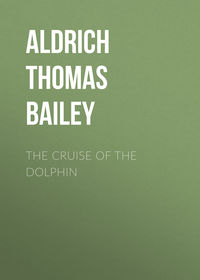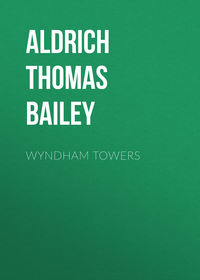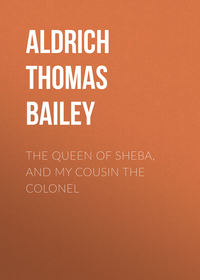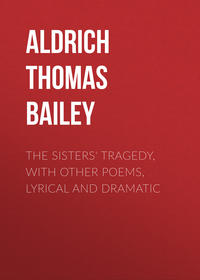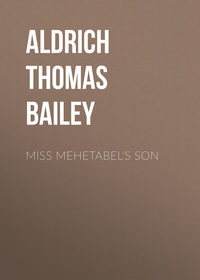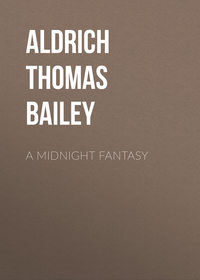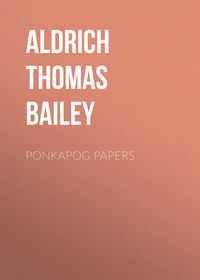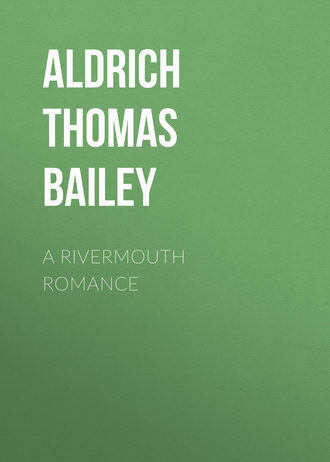 полная версия
полная версияA Rivermouth Romance

Thomas Bailey Aldrich
A Rivermouth Romance
I
At five o’clock on the morning of the tenth of July, 1860, the front door of a certain house on Anchor Street, in the ancient seaport town of Rivermouth, might have been observed to open with great caution. This door, as the least imaginative reader may easily conjecture, did not open itself. It was opened by Miss Margaret Callaghan, who immediately closed it softly behind her, paused for a few seconds with an embarrassed air on the stone step, and then, throwing a furtive glance up at the second-story windows, passed hastily down the street towards the river, keeping close to the fences and garden walls on her left.
There was a ghost-like stealthiness to Miss Margaret’s movements, though there was nothing whatever of the ghost about Miss Margaret herself. She was a plump, short person, no longer young, with coal-black hair growing low on the forehead, and a round face that would have been nearly meaningless if the features had not been emphasized—italicized, so to speak—by the small-pox. Moreover, the brilliancy of her toilet would have rendered any ghostly hypothesis untenable. Mrs. Solomon (we refer to the dressiest Mrs. Solomon, whichever one that was) in all her glory was not arrayed like Miss Margaret on that eventful summer morning. She wore a light-green, shot-silk frock, a blazing red shawl, and a yellow crape bonnet profusely decorated with azure, orange, and magenta artificial flowers. In her hand she carried a white parasol. The newly risen sun, ricocheting from the bosom of the river and striking point blank on the top-knot of Miss Margaret’s gorgeousness, made her an imposing spectacle in the quiet street of that Puritan village. But, in spite of the bravery of her apparel, she stole guiltily along by garden walls and fences until she reached a small, dingy frame-house near the wharves, in the darkened doorway of which she quenched her burning splendor, if so bold a figure is permissible.
Three quarters of an hour passed. The sunshine moved slowly up Anchor Street, fingered noiselessly the well-kept brass knockers on either side, and drained the heeltaps of dew which had been left from the revels of the fairies overnight in the cups of the morning-glories. Not a soul was stirring yet in this part of the town, though the Rivermouthians are such early birds that not a worm may be said to escape them. By and by one of the brown Holland shades at one of the upper windows of the Bilkins mansion—the house from which Miss Margaret had emerged—was drawn up, and old Mr. Bilkins in spiral nightcap looked out on the sunny street. Not a living creature was to be seen, save the dissipated family cat—a very Lovelace of a cat that was not allowed a night-key—who was sitting on the curbstone opposite, waiting for the hall door to be opened. Three quarters of an hour, we repeat, had passed, when Mrs. Margaret O’Rourke, née Callaghan, issued from the small, dingy house by the river, and regained the door-step of the Bilkins mansion in the same stealthy fashion in which she had left it.
Not to prolong a mystery that must already oppress the reader, Mr. Bilkins’s cook had, after the manner of her kind, stolen out of the premises before the family were up, and got herself married—surreptitiously and artfully married, as if matrimony were an indictable offence.
And something of an offence it was in this instance. In the first place Margaret Callaghan had lived nearly twenty years with the Bilkins family, and the old people—there were no children now—had rewarded this long service by taking Margaret into their affections. It was a piece of subtile ingratitude for her to marry without admitting the worthy couple to her confidence. In the next place, Margaret had married a man some eighteen years younger than herself. That was the young man’s lookout, you say. We hold it was Margaret that was to blame. What does a young blade of twenty-two know? Not half so much as he thinks he does. His exhaust-less ignorance at that age is a discovery which is left for him to make in his prime.
“Curly gold locks cover foolish brains, Billing and cooing is all your cheer; Sighing and singing of midnight strains, Under Bonnybell’s window panes,— Wait till you come to Forty Year!”In one sense Margaret’s husband had come to forty year—she was forty to a day.
Mrs. Margaret O’Rourke, with the baddish cat following close at her heels, entered the Bilkins mansion, reached her chamber in the attic without being intercepted, and there laid aside her finery. Two or three times, while arranging her more humble attire, she paused to take a look at the marriage certificate, which she had deposited between the leaves of her Prayer-Book, and on each occasion held that potent document upside down; for Margaret’s literary culture was of the severest order, and excluded the art of reading.
The breakfast was late that morning. As Mrs. O’Rourke set the coffee-urn in front of Mrs. Bilkins and flanked Mr. Bilkins with the broiled mackerel and buttered toast, Mrs. O’Rourke’s conscience smote her. She afterwards declared that when she saw the two sitting there so innocent-like, not dreaming of the comether she had put upon them, she secretly and unbeknownst let a few tears fall into the cream-pitcher. Whether or not it was this material expression of Margaret’s penitence that spoiled the coffee does not admit of inquiry; but the coffee was bad. In fact, the whole breakfast was a comedy of errors.
It was a blessed relief to Margaret when the meal was ended. She retired in a cold perspiration to the penetralia of the kitchen, and it was remarked by both Mr. and Mrs. Bilkins that those short flights of vocalism—apropos of the personal charms of one Kate Kearney who lived on the banks of Killarney—which ordinarily issued from the direction of the scullery were unheard that forenoon.
The town clock was striking eleven, and the antiquated timepiece on the staircase (which never spoke but it dropped pearls and crystals, like the fairy in the story) was lisping the hour, when there came three tremendous knocks at the street door. Mrs. Bilkins, who was dusting the brass-mounted chronometer in the hall, stood transfixed, with arm uplifted. The admirable old lady had for years been carrying on a guerilla warfare with itinerant venders of furniture polish, and pain-killer, and crockery cement, and the like. The effrontery of the triple knock convinced her the enemy was at her gates—possibly that dissolute creature with twenty-four sheets of note-paper and twenty-four envelopes for fifteen cents.
Mrs. Bilkins swept across the hall, and opened the door with a jerk. The suddenness of the movement was apparently not anticipated by the person outside, who, with one arm stretched feebly towards the receding knocker, tilted gently forward, and rested both hands on the threshold in an attitude which was probably common enough with our ancestors of the Simian period, but could never have been considered graceful. By an effort that testified to the excellent condition of his muscles, the person instantly righted himself, and stood swaying unsteadily on his toes and heels, and smiling rather vaguely on Mrs. Bilkins.
It was a slightly-built but well-knitted young fellow, in the not unpicturesque garb of our marine service. His woollen cap, pitched forward at an acute angle with his nose, showed the back part of a head thatched with short yellow hair, which had broken into innumerable curls of painful tightness. On his ruddy cheeks a sparse sandy beard was making a timid début. Add to this a weak, good-natured mouth, a pair of devil-may-care blue eyes, and the fact that the man was very drunk, and you have a pre-Raphaelite portrait—we may as well say it at once—of Mr. Larry O’Rourke of Mullingar, County Westmeath, and late of the United States sloop-of-war Santee.
The man was a total stranger to Mrs. Bilkins; but the instant she caught sight of the double white anchors embroidered on the lapels of his jacket, she unhesitatingly threw back the door, which with great presence of mind she had partly closed.
A drunken sailor standing on the step of the Bilkins mansion was no novelty. The street, as we have stated, led down to the wharves, and sailors were constantly passing. The house abutted directly on the street; the granite door-step was almost flush with the sidewalk, and the huge old-fashioned brass knocker—seemingly a brazen hand that had been cut off at the wrist, and nailed against the oak as a warning to malefactors—extended itself in a kind of grim appeal to everybody. It seemed to possess strange fascinations for all seafaring folk; and when there was a man-of-war in port the rat-tat-tat of that knocker would frequently startle the quiet neighborhood long after midnight. There appeared to be an occult understanding between it and the blue-jackets. Years ago there was a young Bilkins, one Pendexter Bilkins—a sad losel, we fear—who ran away to try his fortunes before the mast, and fell overboard in a gale off Hatteras. “Lost at sea,” says the chubby marble slab in the Old South Burying-Ground, “ætat 18.” Perhaps that is why no blue-jacket, sober or drunk, was ever repulsed from the door of the Bilkins mansion.
Of course Mrs. Bilkins had her taste in the matter, and preferred them sober. But as this could not always be, she tempered her wind, so to speak, to the shorn lamb. The flushed, prematurely old face that now looked up at her moved the good lady’s pity.
“What do you want?” she asked kindly.
“Me wife.”
“There ‘s no wife for you here,” said Mrs. Bilkins, somewhat taken aback. “His wife!” she thought; “it’s a mother the poor boy stands in need of.”
“Me wife,” repeated Mr. O’Rourke, “for betther or for worse.”
“You had better go away,” said Mrs. Bilkins, bridling up, “or it will be the worse for you.”
“To have and to howld,” continued Mr. O’Rourke, wandering retrospectively in the mazes of the marriage service, “to have and to howld, till death—bad luck to him!—takes one or the ither of us.”
“You ‘re a blasphemous creature,” said Mrs. Bilkins, severely.
“Thim ‘s the words his riverince spake this mornin’, standin’ foreninst us,” explained Mr. O’Rourke. “I stood here, see, and me jew’l stood there, and the howly chaplain beyont.”
And Mr. O’Rourke with a wavering forefinger drew a diagram of the interesting situation on the door-step.
“Well,” returned Mrs. Bilkins, “if you ‘re a married man, all I have to say is, there’s a pair of fools instead of one. You had better be off; the person you want does n’t live here.”
“Bedad, thin, but she does.”
“Lives here?”
“Sorra a place else.”
“The man’s crazy,” said Mrs. Bilkins to herself.
While she thought him simply drunk she was not in the least afraid; but the idea that she was conversing with a madman sent a chill over her. She reached back her hand preparatory to shutting the door, when Mr. O’Rourke, with an agility that might have been expected from his previous gymnastics, set one foot on the threshold and frustrated the design.
“I want me wife,” he said sternly.
Unfortunately, Mr. Bilkins had gone up town, and there was no one in the house except Margaret, whose pluck was not to be depended on. The case was urgent. With the energy of despair Mrs. Bilkins suddenly placed the toe of her boot against Mr. O’Rourke’s invading foot, and pushed it away. The effect of this attack was to cause Mr. O’Rourke to describe a complete circle on one leg, and then sit down heavily on the threshold. The lady retreated to the hat-stand, and rested her hand mechanically on the handle of a blue cotton umbrella. Mr. O’Rourke partly turned his head and smiled upon her with conscious superiority. At this juncture a third actor appeared on the scene, evidently a friend of Mr. O’Rourke, for he addressed that gentleman as “a spalpeen,” and told him to go home.
“Divil an inch,” replied the spalpeen; but he got himself off the threshold, and returned his position on the step.
“It’s only Larry, mum,” said the man, touching his forelock politely; “as dacent a lad as iver lived, when he ‘s not in liquor; an’ I ‘ve known him to be sober for days to-gither,” he added, reflectively. “He don’t mane a ha’p’orth o’ harum, but jist now he’s not quite in his right moind.”
“I should think not,” said Mrs. Bilkins, turning from the speaker to Mr. O’Rourke, who had seated himself gravely on the scraper, and was weeping. “Hasn’t the man any friends?”
“Too many of ‘em, mum, an’ it’s along wid dhrinkin’ toasts wid ‘em that Larry got throwed. The punch that spalpeen has dhrunk this day would amaze ye. He give us the slip awhiles ago, bad ‘cess to him, an’ come up here. Did n’t I tell ye, Larry, not to be afther ringin’ at the owld gintleman’s knocker? Ain’t ye got no sinse at all?”
“Misther Donnehugh,” responded Mr. O’Rourke with great dignity, “ye ‘re dhrunk agin.”
Mr. Donnehugh, who had not taken more than thirteen ladles of rum-punch, disdained to reply directly.
“He’s a dacent lad enough”—this to Mrs. Bilkins—“but his head is wake. Whin he’s had two sups o’ whiskey he belaves he’s dhrunk a bar’l full. A gill o’ wather out of a jimmy-john ‘d fuddle him, mum.”
“Is n’t there anybody to look after him?”
“No, mum, he’s an orphan; his father and mother live in the owld counthry, an’ a fine hale owld couple they are.”
“Has n’t he any family in the town”—
“Sure, mum, he has a family; was n’t he married this blessed mornin’?”
“He said so.”
“Indade, thin, he was—the pore divil!”
“And the—the person?” inquired Mrs. Bilkins.
“Is it the wife, ye mane?”
“Yes, the wife: where is she?”
“Well, thin, mum,” said Mr. Donnehugh, “it’s yerself can answer that.”
“I?” exclaimed Mrs. Bilkins. “Good heavens! this man’s as crazy as the other!”
“Begorra, if anybody’s crazy, it’s Larry, for it’s Larry has married Margaret.”
“What Margaret?” cried Mrs. Bilkins, with a start.
“Margaret Callaghan, sure.”
“Our Margaret? Do you mean to say that OUR Margaret has married that—that good-for-nothing, inebriated wretch!”
“It’s a civil tongue the owld lady has, any way,” remarked Mr. O’Rourke, critically, from the scraper.
Mrs. Bilkins’s voice during the latter part of the colloquy had been pitched in a high key; it rung through the hall and penetrated to the kitchen, where Margaret was thoughtfully wiping the breakfast things. She paused with a half-dried saucer in her hand, and listened. In a moment more she stood, with bloodless face and limp figure, leaning against the banister, behind Mrs. Bilkins.
“Is it there ye are, me jew’l!” cried Mr. O’Rourke, discovering her.
Mrs. Bilkins wheeled upon Margaret.
“Margaret Callaghan, is that thing your husband?”
“Ye-yes, mum,” faltered Mrs. O’Rourke, with a woful lack of spirit.
“Then take it away!” cried Mrs. Bilkins.
Margaret, with a slight flush on either cheek, glided past Mrs. Bilkins, and the heavy oak door closed with a bang, as the gates of Paradise must have closed of old upon Adam and Eve.
“Come!” said Margaret, taking Mr. O’Rourke by the hand; and the two wandered forth upon their wedding journey down Anchor Street, with all the world before them where to choose. They chose to halt at the small, shabby tenement-house by the river, through the doorway of which the bridal pair disappeared with a reeling, eccentric gait; for Mr. O’Rourke’s intoxication seemed to have run down his elbow, and communicated itself to Margaret. O Hymen! who burnest precious gums and scented woods in thy torch at the melting of aristocratic hearts, with what a pitiful penny-dip thou hast lighted up our little back-street romance!
II
It had been no part of Margaret’s plan to acknowledge the marriage so soon. Though on pleasure bent, she had a frugal mind. She had invested in a husband with a view of laying him away for a rainy day—that is to say, for such time as her master and mistress should cease to need her services; for she had promised on more than one occasion to remain with the old people as long as they lived. Indeed, if Mr. O’Rourke had come to her and said in so many words, “The day you marry me you must leave the Bilkins family,” there is very little doubt but Margaret would have let that young sea-monster slip back unmated, so far as she was concerned, into his native element. The contingency never entered into her calculations. She intended that the ship which had brought Ulysses to her island should take him off again after a decent interval of honeymoon; then she would confess all to Mrs. Bilkins, and be forgiven, and Mr. Bilkins would not cancel that clause supposed to exist in his will bequeathing two first-mortgage bonds of the Squedunk E. B. Co. to a certain faithful servant. In the mean while she would add each month to her store in the coffers of the Rivermouth Savings Bank; for Calypso had a neat sum to her credit on the books of that provident institution.
But this could not be now. The volatile bridegroom had upset the wisely conceived plan, and “all the fat was in the fire,” as Margaret philosophically put it. Mr. O’Rourke had been fully instructed in the part he was to play, and, to do him justice, had honestly intended to play it; but destiny was against him. It may be observed that destiny and Mr. O’Rourke were not on very friendly terms.
After the ceremony had been performed and Margaret had stolen back to the Bilkins mansion, as related, Mr. O’Rourke with his own skilful hands had brewed a noble punch for the wedding guests. Standing at the head of the table and stirring the pungent mixture in a small wash-tub purchased for the occasion, Mr. O’Rourke came out in full flower. His flow of wit, as he replenished the glasses, was as racy and seemingly as inexhaustible as the punch itself. When Mrs. McLaughlin held out her glass, inadvertently upside down, for her sixth ladleful, Mr. O’Rourke gallantly declared it should be filled if he had to stand on his head to do it. The elder Miss O’Leary whispered to Mrs. Connally that Mr. O’Rourke was “a perfic gintleman,” and the men in a body pronounced him a bit of the raal shamrock. If Mr. O’Rourke was happy in brewing a punch, he was happier in dispensing it, and happiest of all in drinking a great deal of it himself. He toasted Mrs. Finnigan, the landlady, and the late lamented Finnigan, the father, whom he had never seen, and Miss Biddy Finnigan, the daughter, and a young toddling Finnigan, who was at large in shockingly scant raiment. He drank to the company individually and collectively, drank to the absent, drank to a tin-peddler who chanced to pass the window, and indeed was in that propitiatory mood when he would have drunk to the health of each separate animal that came out of the Ark. It was in the midst of the confusion and applause which followed his song, “The Wearing of the Grane,” that Mr. O’Rourke, the punch being all gone, withdrew unobserved, and went in quest of Mrs. O’Rourke—with what success the reader knows.
According to the love-idyl of the period, when Laura and Charles Henry, after unheard-of obstacles, are finally united, all cares and tribulations and responsibilities slip from their sleek backs like Christian’s burden. The idea is a pretty one, theoretically, but, like some of those models in the Patent Office at Washington, it fails to work. Charles Henry does not go on sitting at Laura’s feet and reading Tennyson to her forever: the rent of the cottage by the sea falls due with prosaic regularity; there are bakers, and butchers, and babies, and tax-collectors, and doctors, and undertakers, and sometimes gentlemen of the jury, to be attended to. Wedded life is not one long amatory poem with recurrent rhymes of love and dove, and kiss and bliss. Yet when the average sentimental novelist has supplied his hero and heroine with their bridal outfit and arranged that little matter of the marriage certificate, he usually turns off the gas, puts up his shutters, and saunters off with his hands in his pockets, as if the day’s business were over. But we, who are honest dealers in real life and disdain to give short weight, know better. The business is by no means over; it is just begun. It is not Christian throwing off his pack for good and all, but Christian taking up a load heavier and more difficult than any he has carried.
If Margaret Callaghan, when she meditated matrimony, indulged in any roseate dreams, they were quickly put to flight. She suddenly found herself dispossessed of a quiet, comfortable home, and face to face with the fact that she had a white elephant on her hands. It is not likely that Mr. O’Rourke assumed precisely the shape of a white elephant to her mental vision; but he was as useless and cumbersome and unmanageable as one.
Margaret and Larry’s wedding tour did not extend beyond Mrs. Finnigan’s establishment, where they took two or three rooms and set up housekeeping in a humble way. Margaret, who was a tidy housewife, kept the floor of her apartments as white as your hand, the tin plates on the dresser as bright as your lady-love’s eyes, and the cooking-stove as neat as the machinery on a Sound steamer. When she was not rubbing the stove with lamp-black she was cooking upon it some savory dish to tempt the palate of her marine monster. Naturally of a hopeful temperament, she went about her work singing softly to herself at times, and would have been very happy that first week if Mr. O’Rourke had known a sober moment. But Mr. O’Rourke showed an exasperating disposition to keep up festivities. At the end of ten days, however, he toned down, and at Margaret’s suggestion that he had better be looking about for some employment he rigged up a fishing-pole, and set out with an injured air for the wharf at the foot of the street, where he fished for the rest of the day. To sit for hours blinking in the sun, waiting for a cunner to come along and take his hook, was as exhaustive a kind of labor as he cared to engage in. Though Mr. O’Rourke had recently returned from a long cruise, he had not a cent to show. During his first three days ashore he had dissipated his three years’ pay. The housekeeping expenses began eating a hole in Margaret’s little fund, the existence of which was no sooner known to Mr. O’Rourke than he stood up his fishing-rod in one corner of the room, and thenceforth it caught nothing but cobwebs.
“Divil a sthroke o’ work I ‘ll do,” said Mr. O’Rourke, “whin we can live at aise on our earnin’s. Who ‘d be afther frettin’ hisself, wid money in the bank? How much is it, Peggy darlint?”
And divil a stroke more of work did he do. He lounged down on the wharves, and, with his short clay pipe stuck between his lips and his hands in his pockets, stared off at the sail-boats on the river. He sat on the door-step of the Finnigan domicile, and plentifully chaffed the passers-by. Now and then, when he could wheedle some fractional currency out of Margaret, he spent it like a crown-prince at The Wee Drop around the corner. With that fine magnetism which draws together birds of a feather, he shortly drew about him all the ne’er-do-weels of Rivermouth.
It was really wonderful what an unsuspected lot of them there was. From all the frowzy purlieus of the town they crept forth into the sunlight to array themselves under the banner of the prince of scallawags. It was edifying of a summer afternoon to see a dozen of them sitting in a row, like turtles, on the string-piece of Jedediah Rand’s wharf, with their twenty-four feet dangling over the water, assisting Mr. O’Rourke in contemplating the islands in the harbor, and upholding the scenery, as it were.
The rascal had one accomplishment, he had a heavenly voice—quite in the rough, to be sure—and he played, on the violin like an angel. He did not know one note from another, but he played in a sweet natural way, just as Orpheus must have played, by ear. The drunker he was the more pathos and humor he wrung from the old violin, his sole piece of personal property. He had a singular fancy for getting up at two or three o’clock in the morning, and playing by an open casement, to the distraction of all the dogs in the immediate neighborhood and innumerable dogs in the distance.
Unfortunately, Mr. O’Rourke’s freaks were not always of so innocent a complexion. On one or two occasions, through an excess of animal and other spirits, he took to breaking windows in the town. Among his nocturnal feats he accomplished the demolition of the glass in the door of The Wee Drop. Now, breaking windows in Rivermouth is an amusement not wholly disconnected with an interior view of the police-station (bridewell is the local term); so it happened that Mr. O’Rourke woke up one fine morning and found himself snug and tight in one of the cells in the rear of the Brick Market. His plea that the bull’s-eye in the glass door of The Wee Drop winked at him in an insult-in’ manner as he was passing by did not prevent Justice Hackett from fining the delinquent ten dollars and costs, which made sad havoc with the poor wife’s bank account. So Margaret’s married life wore on, and all went merry as a funeral knell.


